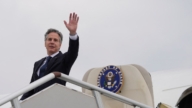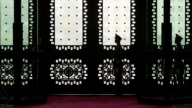【新唐人2011年7月16日訊】廈門副市長臧傑斌在廈門市一個會議上發表雷人言論,聲稱德國老百姓上網非常困難,要經過層層審批,引來民眾炮轟。德國駐華大使館的官方博客也正式進行反駁。曾在德國訪問過的學者驚呼廈門副市長在講天方夜譚。
廈門副市長臧傑斌7月10號在廈門市一個交流會上,聲稱去年四月份,他曾經到德國進行考察學習,在那兒呆了半個月。他發現德國老百姓上網非常非常困難,要經過層層審批,而且費用很高。而且還說,西方國家對意識形態和新興媒體的管理,遠遠超過中國,所以中國還是非常民主的,中國人民應該感到幸福。
廈門副市長臧傑斌:「大家應該感到榮幸,我們現在上互聯網很簡單,在那邊,要經過很多很多審批途徑,很多渠道才能上網,而且費用很高。」
德國駐華大使館7月13號下午通過官方《搜狐》博客,發表文章反駁說,每個去過德國的人都知道,任何人都可以上網,也不需要通過任何官方機構的審批。人們可以隨時去眾多公共網吧上網,並且不用登記。德國對網路不存在監管,除了極少數內容是被禁止的,比如否定納粹大屠殺,或者納粹的標誌。但這些禁令是議會通過民主的程序決定,並且在法律中明文寫下的。
居住在瑞典的中國流亡作家茉莉多次訪問德國。她驚呼廈門副市長在開玩笑。
茉莉:「這個人是不是有毛病啊?這個人一定有毛病。德國是世界言論自由前二十名。中國是一百四十幾名。這樣的比較,難道德國還會有禁止上網,還要批准嗎?很可笑啊。德國只是有兒童色情禁止。其他的政治言論完全沒有禁止。中國就是黃色的東西遍地開花。但是真正關心國家關心社會的政治性言論都被禁止。所以這是完全相反的兩個極端。」
前北京大學新聞學院副教授焦國標,曾經接受「德國筆會」邀請,去德國訪問一年半,他表示,自己當時住在普通居民樓裡,上網非常方便,可以看到世界各國的網站,沒有任何國家機構進行過濾審查。廈門副市長完全是信口雌黃,愚弄老百姓。
焦國標:「也就是說他不是對實際負責的。他腦子裡是沒有真實性的。而且根本的問題他就是對民眾的尊嚴,人格的糟蹋、侮辱。就是說,我就是說假話了。你能怎麼著啊?你有這個講臺嗎?你能糾正我嗎?你不能。我愛說甚麼說甚麼。」
臧傑斌的講話視頻最初發佈在《新浪網》視頻頻道,播出後迅速引髮網友炮轟。一名移居德國柏林的網友表示,德國免費上網滿街都是,家庭寬頻交錢就給安裝,最高100MB頻寬,他使用的32MB頻寬每月19歐元。
據德國《時代週報》一篇署名唐明燈的文章說,2008年的一項權威統計顯示,包括德國在內的互聯網最發達的10個國家和地區,固定寬頻費用人均佔GDP的1%左右。而中國的這一比重為7.4%,屬於互聯網資費水準最高的國家和地區之一,中國寬頻資費絕對值相當於近鄰韓國的22倍。
上海《東方衛視》新聞欄目主持人語重心長的告誡臧傑斌說:「在信息化的時代撒謊真的是一件非常愚蠢的事情。不負責任的信口胡說是很容易被網民戳穿的。」
新唐人記者秦雪、蕭宇採訪報導。
German Internet Libel Refuted
Vice Mayor of Xiamen, Zang Jiebin made some ridiculous remarks on a conference,
claiming that to use the Internet, the German have to go through layers of approval.
His remarks drew heavy criticism. German Embassy’s official blog also refuted Zang』s claims.
On a meeting held on July 10 in Xiamen,
Zang claimed that when he was on a 2-week study tour in Germany in April 2010,
he found the German Internet requiring governmental approvals and very costly.
He also said, Western countries』 control of ideology and new media far exceeds that of China. Therefore, Zang claimed that China is very democratic,
and the Chinese people should feel happy.
Zang: It is easy for us to get online. Over there (in Germany),
people need to go through many approvals. It is also very costly.
On July 13, German Embassy published an article on its official Sohu blog,
arguing that it is widely known that anyone can access Internet in Germany,
and there is no governmental approval needed to get Internet.
People can go to public Internet cafes, without registration.
Germany does not monitor the Internet.
Only a small amount of information is prohibited,
such as Holocaust denial and the Nazi symbol.
However, these prohibitions were decided by the Parliament through democratic procedures, and written in the law.
Exiled Chinese writer Mo Li visits Germany often.
She exclaimed that the vice mayor of Xiamen must be joking.
Mo Li: Is this man mentally confused? This person must have problems.
Germany is one of the top 20 countries, in terms of freedom of speech.
China ranks lower than the 140th.
According to such a comparison, would Internet be banned in Germany?
This is very ridiculous. In Germany, only child pornography is prohibited.
Political comments are not prohibited at all.
China is filled with pornography, but comments concerning people』s well-being
or political in nature are all banned.
Germany and China are two extremes.
Jiao Guobiao, ex-associate professor at Peking University』s School of Journalism,
was invited by German PEN organization to visit Germany for one year and a half.
He said the Internet is very accessible.
People can visit websites from around the world.
There is no governmental agency censor or monitor online activities.
The vice mayor of Xiamen was making careless remarks to fool people.
Jiao Guobiao: That is, he was not responsible.
He doesn』t have the truth in mind.
The most fundamental problem is that he humiliates people』s dignity and personality.
He meant, “Yes I did lie, but what can you do with me?
Can you correct me when I am talking? No, you cannot.
I can say what I want to say. “
A video of Zang』s remarks was first posted on Sina.com.
It soon drew netizens』 heavy criticism.
A Chinese immigrant in Berlin, Germany, said,
there is free Internet on the streets in Germany.
The maximum household bandwidth is100 MB.
He spends 19 Euros per month for 32MB of bandwidth.
According to the German newspaper Die Zeit,
according to a 2008 poll, in 10 developed countries,
including Germany, the use of broadband cost about 1% of GDP.
While in China, it accounted for 7.4% of GDP.
China is one of the countries with the highest Internet costs.
China’s Internet costs are 22 times of those in its neighbor South Korea.
Shanghai』s Dragon TV anchor meaningfully warned Zang Jiebin,
“Lying in the information age is really stupid.
Irresponsible remarks are very easy to be refuted by netizens."
NTD reporters Qin Xue and Xiao Yu




























